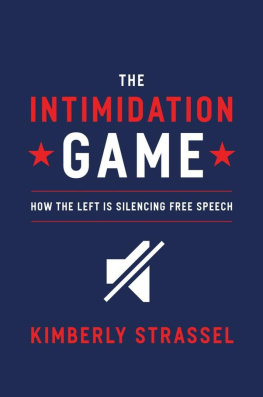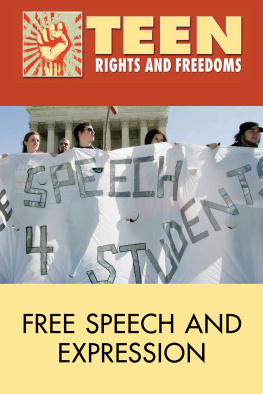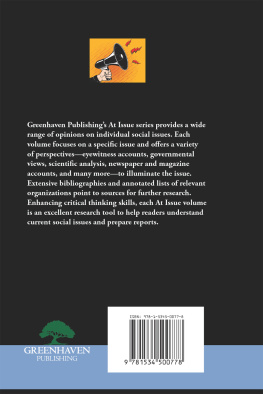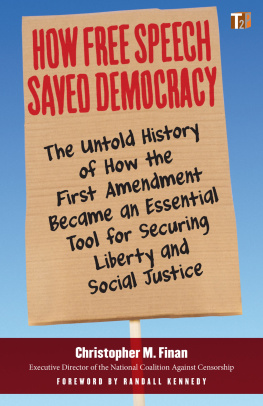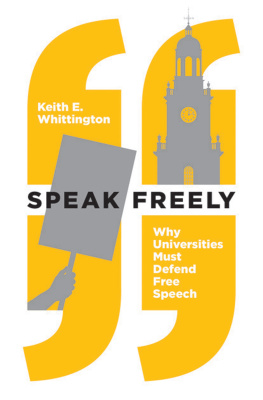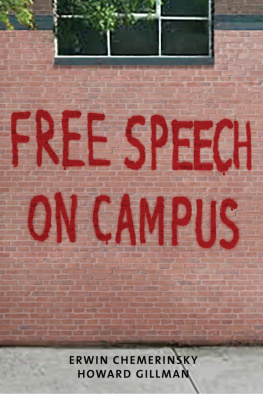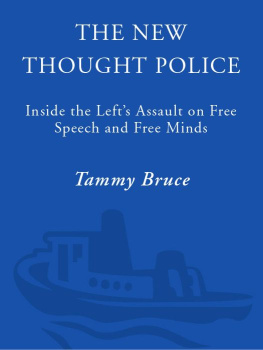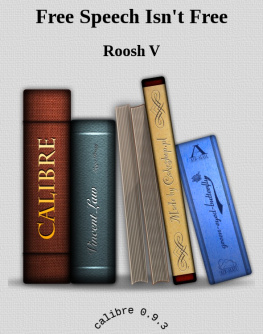Hachette Book Group supports the right to free expression and the value of copyright. The purpose of copyright is to encourage writers and artists to produce the creative works that enrich our culture.
The scanning, uploading, and distribution of this book without permission is a theft of the authors intellectual property. If you would like permission to use material from the book (other than for review purposes), please contact permissions@hbgusa.com. Thank you for your support of the authors rights.
To Oliver, Stella, and Francesthe loves of my life.
And to Alaskafor letting me dream again.
Most people wouldnt think of January 21, 2010, as an important date. It isnt Christmas. It isnt 9/11. It isnt a national holiday.
Yet that day marks a turning point in American politics.
January 21, 2010, is when the Supreme Court ruled on a case known as Citizens United. To listen to President Barack Obama, or Senator Harry Reid, or any number of self-proclaimed good government organizations, this decision mattered because it marked a new tidal wave of dark money and shadowy organizations into elections. It supposedly gave powerful special interests new control over democracy.
Citizens United didnt do any of that. But it did unleash a new era. It set off a new campaign of retribution and threats against conservatives. Citizens United launched the modern intimidation game.
Up to that day, Republicans and Democrats had played a different game, a familiar one. Both sides had spent a hundred years using speech laws, also known as campaign finance laws, to bar their respective opponents from taking part in elections. Democrats barred companies. Republicans barred unions. Democrats restricted right-leaning groups. Republicans restricted left-leaning groups. The laws kept piling up and up, until the Supreme Court could no longer justify the assault on the First Amendment. Citizens United swept much of it away. Five justices restored the speech rights of millions of Americans.
The political right and libertarians mostly celebrated the decision as a triumph for democracy. The political left had the opposite reaction. Obama was on the ropes. Hed passed Obamacare, and Dodd-Frank, and a blowout stimulus spending billand America hadnt liked it. The party faced a wipeout in the 2010 elections. And now the high court had said Democrats could no longer legally shut up the companies and conservative nonprofits mobilizing against his party.
So the left moved to plan B. It moved to harass and scare and shame its opponents out of speaking.
Some in the liberal movement, including Obama and congressional Democrats, trained the federal government on opponents. They encouraged, explicitly and implicitly, the IRS to target and freeze conservative groups during election years. They called out conservative donors by name, making them the targets of a vast and threatening federal bureaucracy. They filed complaints with federal regulators and the Justice Department, calling on them to hassle or bar or prosecute their rivals. They came up with proposed executive orders and new IRS and SEC and FCC rules to order or frighten the other side out of the electoral process.
Powerful elected politicians used their positions to hold hearings into conservative political groups and to scare off donors to those operations. They sent letters to companies and think tanks and nonprofits, demanding to know who funded them, and whom they funded in turn. They launched investigations and leaked select details to the press. They flooded groups with document requests to drive up their costs and slow down their work. They made clear that those who donated wrong would end up on blacklists, or in front of Congress, or subject to boycotts.
Unions and liberal financial firms threatened to withdraw their money from companies that continued to speak. They pressured shareholders to force corporations to withdraw from the political scene. Activists camped outside CEOs homes and staged rallies outside corporate headquarters.
Liberal prosecutors stepped up to threaten litigation against organizations that didnt hand over names of donors, so that those donors could be subject to the same treatment. Some prosecutors went much further: They sent armed police to march into houses in predawn raids, to let their opponents know that their exercise of free speech might land them in prison.
Liberal activists took to the streetsto urinate on houses, and block the entrances to stores, and stalk those who didnt agree with them on political issues. They left threatening telephone messages, and delivered ugly e-mails, and got people fired from their jobs for holding unpopular political views.
The intimidators embraced the tools that remained to them. They embraced disclosure laws, using the information they gleaned to create their lists of targets. They embraced arcane bits of campaign finance law, engineering new ways to persecute their opponents. They embraced the Internet and social media platforms, to launch protests, and badger free-market advocates, and even to create searchable, walkable maps that allowed them to harass people, one home at a time.
They also cleverly cloaked all this behind a claim of good government. Citizens United, they said, threatened to put powerful and nefarious forces in charge of democracy. And therefore all of their actions and tactics were justified in the name of the people. It was right to make Tea Party groups wait five years for permission to speak. It was right to send private investigators to dig into the divorce records of conservative donors. It was right to subject federal contractors to political litmus tests. It was right for prosecutors to issue gag orders. It was right to go to the Senate floor to vote to alter the First Amendment, and to put government in charge of speech. Getting rid of speech was for democracys own good.
All these things happened. The stories are in this book. That they did happen, and are still happening, requires every American to rethink some conventional wisdom about the merits of speech and disclosure laws.
Nearly sixty years ago, the Supreme Court issued a groundbreaking decision, NAACP v. Alabama, that protected the rights of Americans to engage in politics with some degree of anonymity. This was the civil rights era, and blacks were being targeted, firebombed, and shot at for daring to speak out. The high court understood how corrosive this was to democracy, and declared that the Constitution provided some measure of refuge to citizens at risk of political retribution.
Yet the Courts brave stand slowly gave way to Nixon-era worries over electoral corruption. It rubber-stamped one campaign finance and disclosure law after another, eating away at its free-speech and anonymity legacy. Conservatives embraced the laws too, hoping to land on the right side of good-government history. In doing so, the conservative movement turbocharged its own muzzlers. Over time, the intimidators came to use the laws themselvesthe ones supposedly designed to guard the electoral processto intimidate.
Today, every American is at risk of retribution, because those who seek to control the debate do not make distinctions based on party affiliation. This book is largely about the new attempt by left-leaning organizations to shut down conservative speech. But the stories show that those who want absolute control over the debate are happy to silence anyone who proves a threat to their ideology.

